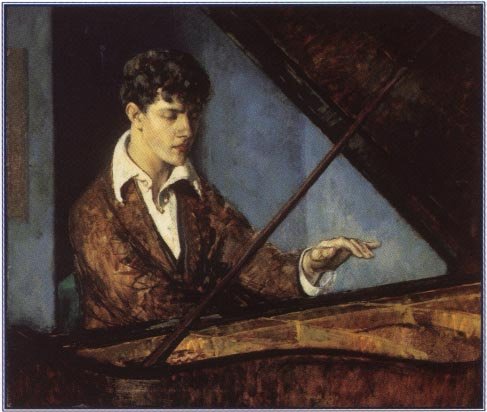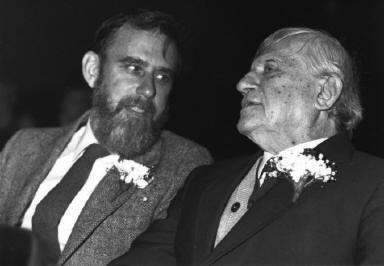|
|
About Leo Ornstein
Personal Reminiscences and Observations
|
|||||||||||||||
| Also in this Section | ||
|
Overview
Personality and Attitudes about Music Approach to Composing Reminiscences and Observations Pauline's Memoir |
||
|
|
||
As children, my sister and I loved to explore the old steamer trunks in our attic. They contained a cornucopia of frilly, outdated dresses, top hats, etc. One day when I was about nine years old I came upon a large scroll at the bottom of one of the trunks. As I unrolled it, giant red letters appeared spelling out my father's name and announcing his appearance at Carnegie Hall. I vaguely knew that he had been a concert pianist before I was born - our mother had always spoken in adulatory terms of our father's importance - but we tended to dismiss that, knowing that her view was heavily biased. This giant scroll, considerably larger than I was as I remember it, and with the magic words "Carnegie Hall Tonight" splashed across it, cast an entirely new light on matters. I remember struggling to comprehend this new revelation. With the innocence of youth, I hadn't realized what an unusual father I had; I suppose I assumed that all fathers must somehow play the piano. I'd been immersed in the sounds of practicing from the cradle onwards and took the background of music as much for granted as the air we breathed.
We had a summer home in the White Mountains of New Hampshire, far up on a hillside, well away from other houses. Still further up the mountain in the forest, a quarter of a mile behind the main house, my father had a one-room studio where he would practice and compose. A Knabe grand had been hauled up there over the snow by a horse-drawn sled many years before. Each winter, while we were away in Philadelphia, the mice would play havoc with the felts of the piano. Finally, at someone's suggestion, we tried putting red pepper into the instrument as a mouse deterrent. It worked, but the next spring when we arrived and my father commenced practicing, a cloud of pepper arose from the piano and for some time thereafter he was forced to work with tears streaming down his face.

|
|
Painting of Leo Ornstein by Leon Kroll; 1918 |
As a youth I had various chores that included, chopping wood, cutting brush, etc. Some of these chores were performed near the studio while the music of Chopin, Liszt, Franck, Beethoven, and Bach poured out around me into the forest. I learned a great deal of music without having any idea what it was that I was hearing. Years later, as I began to listen to records, I would occasionally encounter a piece that I knew perfectly well but had completely forgotten about. It would be difficult to convey the emotional impact of such re-discoveries on the occasions when they occurred.
It was never clear when inspiration would strike. When it did, if he was really captivated by what he heard, he had to get it down as soon as possible. The opening bars of the piano quintet apparently came to him while he was shopping and were originally jotted down on a grocery bag. I have memories of being yanked out of the swimming hole as a child and dragged quickly home with our father humming and singing all the way in order to hang onto an idea until he could get to pencil and paper.
At one point - I must have been twelve or so - I discovered the Schubert Unfinished Symphony and began raving about it to my father. He was amused and said that someday I'd find there were even greater things than ... and here he hummed the opening theme. I was amazed at his summary dismissal of what at the time seemed to me such ravishing music. Some years later, after I came to know music that my father himself had never heard, I became particularly enamored of the Mozart G Minor Quintet and brought a record home to play for him. I was shocked when he said he'd listen, but not to expect him to get quite the same rise that I did out of "one more Mozart Quintet." As a young person still discovering music I was appalled, and only later came to understand his somewhat jaundiced viewpoint.

|
|
Leo speaking with Severo |
When I was attending high school in Philadelphia, I often went to the Friday afternoon concerts at the Academy of Music. At one of these concerts Yehudi Menihin played a Bartok concerto and when I got home and reported on it, Dad asked me if he'd played in tune. I was outraged at the suggestion that such a famous virtuoso might not play in tune, but I've learned since that string players are not always so precise and indeed it's the rare violinist today whose accuracy I find really satisfying.
Sometime in the late 1940s someone wrote to him asking for the music of a piano piece he had written many years before called The Tartar Dance . He no longer had a copy and didn't remember it, but recalled that years earlier he'd taught it to his student Andrew Imbrie, by then a professor of music at U.C. Berkeley. Imbrie was unable to locate his copy, but he remembered the piece and recorded it on a tape that arrived shortly in the mail. My father then set about listening to the tape in order to transcribe it, but he quickly grew impatient and threw up his hands saying "I can write a lot better music than that." The tape, a fine piece of music, is now at the Yale Sound Archive, awaiting transcription by some interested musician.
As I was broadening my knowledge of music, my father would occasionally play something for me that he particularly liked that I had not yet encountered. The Brahms D Minor Violin Sonata was one such piece and I remember him struggling both to remember it and to give a reasonable rendition of the combined piano and violin parts. He was extraordinarily skillful at producing a piano version of anything from a random quartet to a full orchestral piece.
He couldn't stand popular music and if anyone turned on a juke-box in a restaurant, he would promptly leave. Movies presented a problem too, but I think he bore up because he liked the entertainment and knew that the rest of the family did too. He found music of all sorts distracting and assiduously avoided it, especially when he was in the throes of writing. For fear of distraction he even refused to listen to recordings of his own music when they appeared, but when the Louisville Symphony recorded his Nocturne and Dance , he was unable to resist listening to it since he'd never heard it performed. Afterwards he said he must never do such a thing again because it filled his head for days afterwards, destroying his ability to write.
In later years, when he came to visit,
he would often play for me something he'd just completed. One day I surprised
him by playing in turn a movement of his
4th Piano Sonata
for him. When I
finished he said, " I guess you could think of it that way." So much for my
musical abilities.
When a CD appeared with music by both Ornstein and Anthiel,
it occurred to me to ask my father if he'd known Anthiel personally. I knew that
he didn't think much of Antheil's music, but his reply surprised me: It seems
young George had wanted to be a musician, but his father had had something more
practical in mind. Because my father was already well known at the time,
George's father decided to see what Ornstein thought of his son's musical
abilities. After listening to George, my father allowed that indeed he had some
musical talent. Thus, he said, he felt he bore "some responsibility for
unleashing Anthiel on the world."
It didn't occur to me until a few years ago to ask why he
felt the need to practice such long hours. Even years after he'd quit public
performing, he often practiced 7 or 8 hours a day, and my mother said that when
he had been performing, he would practice up to 14 hours a day. Indeed, I can
remember the piano as an almost constant background to my childhood. He said
that he didn't really know but that it was probably just habit. I suspect that
he also felt the need to maintain his skill for teaching, because, far as I
know, he stopped practicing once he had retired.
Interestingly enough, my father rarely listened to music.
Having grown up before records became commonplace, he had learned most of the
music he knew from scores. On rare occasions he deliberately set out to listen
to something, and then his attention was complete. I recall his listening to a
radio broadcast of one of the lengthy Wagner operas sometime in the late 1940s.
I came into the room a number of times in the course of the performance and each
time he was in precisely the same position and totally absorbed in listening. I
had the feeling that the house could have burned down around him and he would
not have budged.
Late in life, after he had stopped composing, I made
cassette tapes for him of some of the Bach Cantatas he particularly loved. But
when we tried to play them for him, we discovered that alas his hearing was no
longer adequate. I started to express regret, but he turned to me with a smile
and a wink, and tapping his head said "Not to worry!" Apparently even when he
was over a hundred there was still plenty cooking in there.

|
|
Leo at 103 |
|
|